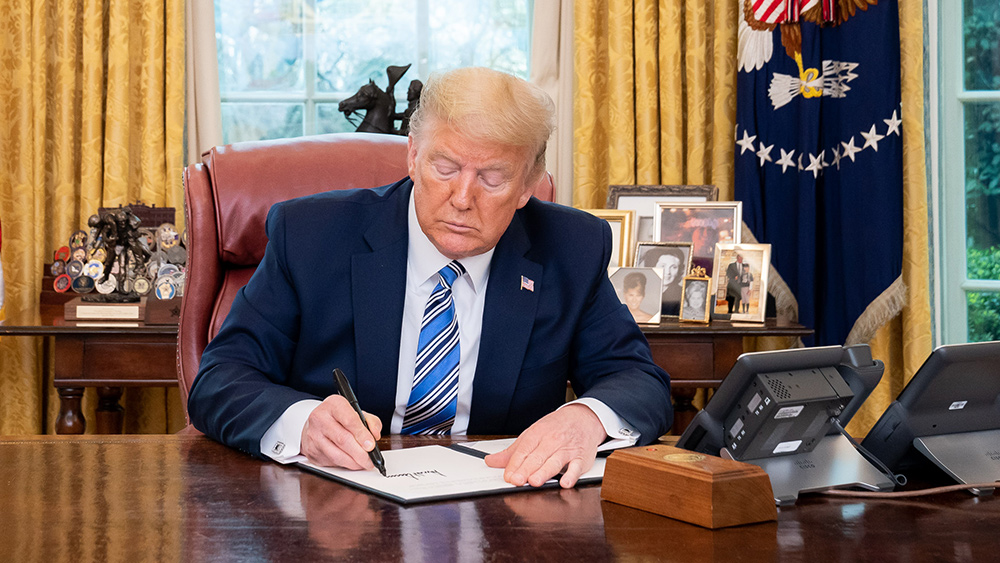Trump signs HALT Fentanyl Act into law
07/20/2025 / By Laura Harris

- President Donald Trump signed the HALT Fentanyl Act on July 16, permanently classifying fentanyl analogues as Schedule I substances, which carry the harshest federal penalties.
- The bipartisan legislation, led by Sen. Chuck Grassley (R-IA), targets traffickers who alter fentanyl’s chemical structure to evade prosecution, reinforcing authority established by the 2018 U.S. v. McCray decision.
- The bill passed with strong bipartisan backing, 84-16 in the Senate and 321-104 in the House, and was supported by major advocacy groups and law enforcement coalitions.
- The law enhances DOJ enforcement capabilities and streamlines the registration process for researchers to study fentanyl-related substances under Schedule I.
- GOP lawmakers, including Sen. Bill Cassidy and Senate Majority Leader John Thune, blamed the Biden administration’s border policies for enabling fentanyl trafficking and promised future legislation focused on border security.
President Donald Trump has signed a measure that will permanently classify fentanyl analogues as Schedule I substances, which carry the harshest federal penalties.
The Halt All Lethal Trafficking of Fentanyl Act (HALT Fentanyl Act), aims to close legal loopholes that previously allowed traffickers to slightly alter fentanyl’s chemical structure to evade prosecution. It was introduced in January by a bipartisan group of senators, including Senate Judiciary Committee Chairman Chuck Grassley (R-IA).
The HALT Fentanyl Act, which received strong bipartisan support in Congress, cements a 2018 temporary order that placed all fentanyl analogues into Schedule I of the Controlled Substances Act. This category is reserved for substances with a high potential for abuse and no accepted medical use. The law passed the Senate in March by a vote of 84-16 and cleared the House of Representatives in June by a margin of 321-104.
Under the new law, fentanyl analogues will continue to be treated as Schedule I substances – meaning those caught trafficking them can face the harshest penalties under federal law. The law also reinforces the legal precedent set by the 2018 case U.S. v. McCray, which confirmed the federal government’s authority to treat chemically similar drugs as fentanyl analogues even when they vary slightly in composition.
The HALT Act not only strengthens enforcement, but also opens the door to further scientific research. The new law includes provisions to streamline the registration process for researchers studying Schedule I substances, allowing more comprehensive investigation into fentanyl and its analogues.
“It’s so sad. It should be so unnecessary that we stand here for years and years doing the same thing over and over,” Trump said during the White House signing ceremony on July 16. He addressed an audience that included families affected by fentanyl-related deaths.
“Everyone knows someone touched by this incredible crisis. So today, on behalf of all Americans who have lost a loved one to opioids, we renew our vow to liberate America from this horrible plague,” Trump continued. According to the chief executive, he has directed the Department of Justice (DOJ) to pursue maximum sentencing for individuals involved in fentanyl trafficking. (Related: Portland declares fentanyl state of emergency as overdose deaths skyrocket.)
GOP lawmakers promise more action to combat fentanyl crisis
Before taking office in January, Trump vowed to take a hard line on countries connected to the fentanyl supply chain, particularly Mexico and China. He has accused both of failing to stop the production and export of the synthetic opioid or its chemical components. Now, he has fulfilled that promise.
Lawmakers and advocates hail the legislation as a major milestone in the fight against the nation’s opioid crisis. Sen. Bill Cassidy (R-LA) tied the crisis directly to U.S. border policy, blaming the Biden administration for failing to curb trafficking, but stressed the need for strong law enforcement tools and warned against allowing the Schedule I classification for fentanyl analogues to expire.
“The Biden administration’s open border was an invitation to drug cartels smuggling Chinese fentanyl into the United States, fueling the U.S. overdose epidemic. Law enforcement must have the tools necessary to combat this trend. We cannot let this Schedule I classification lapse,” Cassidy said.
In line with this, Senate Majority Leader John Thune (R-SD) promised more action to come by creating clearer, more consistent standards for anti-trafficking operations.
“I don’t need to tell anybody about the horrible impact of drug overdoses in this country, many of them caused by fentanyl,” Thune said after the bill passed in the Senate. “In the coming weeks, we’ll be taking up legislation to address another aspect of the fight: Securing our borders.”
Learn more about the fentanyl crisis gripping the U.S. at Addiction.news.
Watch this documentary that tackles the fentanyl crisis in the United States.
This video is from the Little Blue Bird channel on Brighteon.com.
More related stories:
Unveiling the Chinese money-laundering network driving America’s fentanyl crisis.
Nearly 10 million lethal doses of fentanyl seized in San Francisco.
Police union executive involved in FENTANYL deals slapped with federal charges.
Sources include:
Submit a correction >>
Tagged Under:
addiction, big government, drug addiction, drug trafficking, Fentanyl, fentanyl trafficking, HALT Fentanyl Act, harmful medicine, law, Opioids, Schedule I, Trump
This article may contain statements that reflect the opinion of the author





















